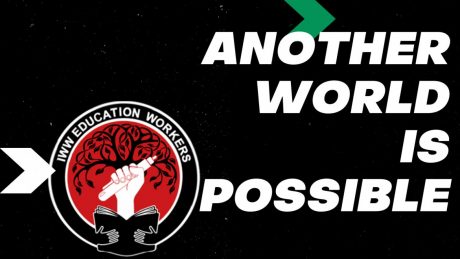An account by a university teacher on a precarious contract about the struggles organising in High Education, the limits of larger business unions and the role of the IWW.
I teach a postgraduate degree at a university ranked in the top 5 in the UK and just outside of the top 100 in the world. I share these metrics because they signify the supposed value of the commodity I deliver to students. However, I have no employment status at the university and am employed by a private contractor half on a fixed term contract and half on a self-employed sole trader contract. It’s my bread and butter.
I cannot belong to the UK trade union normally associated with what I do, UCU. However, having previously been employed by universities in the UK I use to be a very active member of UCU. My experience taught me that UCU is integrated into the institutions in which its members are employed and in practice functions to realize the demands of the most privileged staff. At best it functions to integrate some of the less privileged staff through offering a few the opportunity to join the more privileged ranks. At worst if you are precarious staff like I was you were in fact fighting a different classes battles, for naive words in exchange. Yes! Of course Strike! Learn from it. But be sober.
Any fundamental transformation of higher education is hindered as neither the university or the union is a threat to the ruling classes (if you do not think fundamental transformation is needed, get out of the way). In both cases they are integrated into the capitalist system. And that is just not good enough. Unions cannot simply aim to realize their own particular demands, thus hindering the formation of a more radical movement. This is even more pertinent as workers and what they produce do not make sense as localised to universities in the UK, or the UK itself anymore. And digital workers like myself are just one growing dynamic of that situation.
It is no-good some academics burying their heads in the sand thinking roles like mine should not exist. We do exist. And we do for numerous reasons that do not fit the outdated fight for standardized and increasingly bullshit jobs. We are disabled, we have care responsibilities, we are trying to eek out some quality of life, we have chronic illnesses, plural interests, lack of housing, plagued by pollution, can’t get visas, can’t commute, we are unable to afford transitions to standard jobs, we lack opportunities to do so, we need intermittent work etcetera. We just do not fit the university, or the union and so private contractors pick us up. Until we address theses facts, not as piecemeal bureaucratic adaptations, but as transformation of education, then the future of higher education is increasingly a choice between being me, a digital precariat, or fighting to be a managerial academic.
So the answer is not to try and reproduce the university with the union. It isn’t even to celebrate your pee winning the competition against a 1000 others for a position – even though it’s very human to do so. It is to transform education whilst developing unionisation that can straddle all this in the meantime. This is no easy feat. My colleagues and I have been experimented with what it means to organize workers who are geographically disparate and have a very diverse makeup in all senses. We draw on the training offered by the IWW, that does not ask of its members to fit into a prefabricated strategy that gets slightly reformed across feedback loops that are too large to reflect changes on the ground. Instead we meet where we are at.

The early work of organizing has been to use the idea of dual power. Introducing a recognised position in the form of a staff representative for frontline workers on our programme that answers to a committee of frontline education workers. Introducing a newsletter where we can communicate both about ourselves but also our shared interests, focussing more on practice than on abstracted understanding. Once we have gained traction with these, we have identified how to stop the flow of money and data that keeps the keeps the programme turning over. We are seeking solidarity with the fellow humans outside of management who make these flows. If our grievances are not addressed, we hope to combine all these threads to protect those on the frontline of education, workers, and students alike in inevitable asset stripping exercises or the like.
But this still is not enough. With others I have started exploring avenues for making alternate bids to the university to compete with the private contractor. The benefit of this is that we can then decentralize the programme’s means of production between us, which is both cheaper and also more effective at removing bullshit work from our lives. We can also move away from the idea of “content” and start to ground the dualism – in the sciences at least – between those who understand theory but don’t learn in practice and those who practice but don’t learn theory.
Increasingly though, the momentum is moving toward the best-case scenario: to ditch the entire pipeline-career model of education all together. The beautiful stuff that happens in education is in spite of this model. I am meeting with multiple collectives of recovering and surviving scholars to discuss bringing together people in frontline education as part of platform cooperatives, studio laboratories and library commons to realize themselves in practice, not in abstraction. To practice with new tools, epistemologies, media, theories, and spaces. Because outside of a scattering of beautiful experiments we are inspired by what is, academia is the ever thinned down ivory tower making micro-reformations to survive the transnational supermarketization of the world and its anti-intellectualism.
We are fed up with training people in ways of thinking that reproduce the delusional world we live in. We are fed up finding meaning in cracks in between mostly bullshit, or zero-hour contracts. The occasions where we can actually build relationships and experience a little meaning. We do not have the right to strike, yet. We will find a way to cultivate solidarity, fight, and grow another education practice.
—
If any of this resonates with you and you would like to join an autonomous education workers group supported by IWW and no geographical affiliation, please get in contact – educationworkercollective [at] gmail [dot] com
Do you work in education, in any capacity? Join the IWW’s Education Workers Industrial Union.
